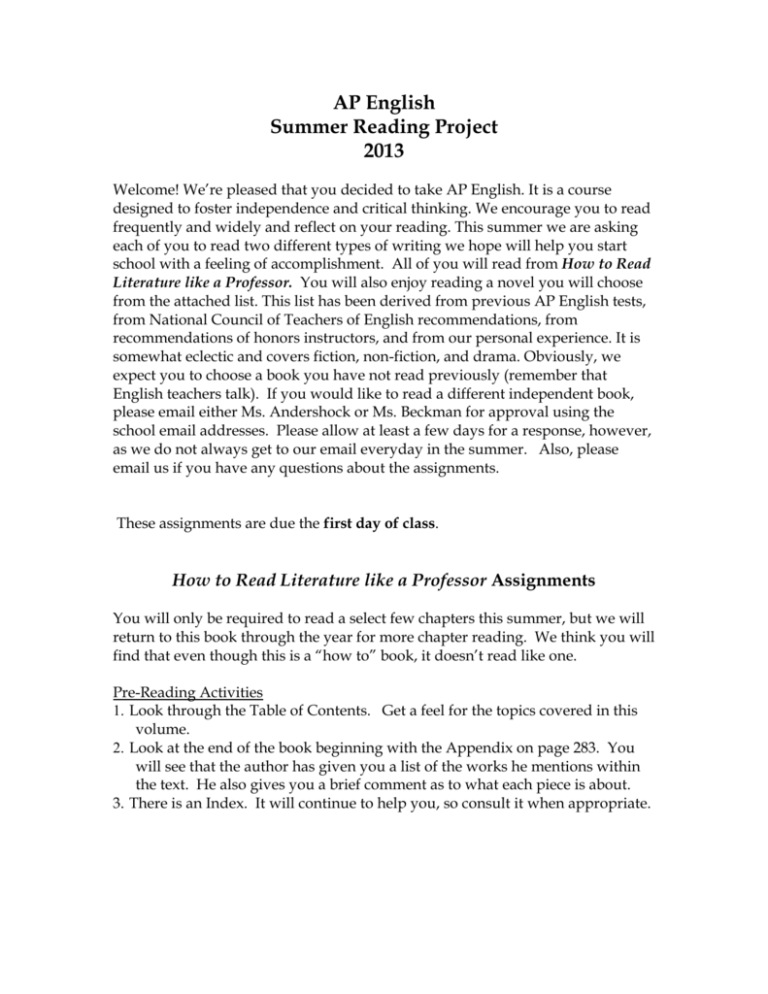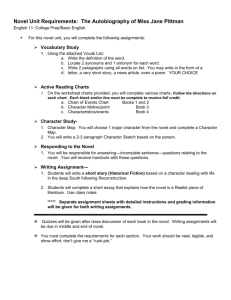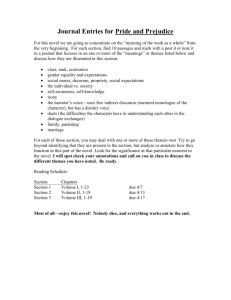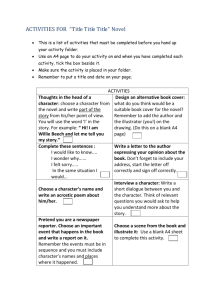AP-Lit_Summer
advertisement

AP English Summer Reading Project 2013 Welcome! We’re pleased that you decided to take AP English. It is a course designed to foster independence and critical thinking. We encourage you to read frequently and widely and reflect on your reading. This summer we are asking each of you to read two different types of writing we hope will help you start school with a feeling of accomplishment. All of you will read from How to Read Literature like a Professor. You will also enjoy reading a novel you will choose from the attached list. This list has been derived from previous AP English tests, from National Council of Teachers of English recommendations, from recommendations of honors instructors, and from our personal experience. It is somewhat eclectic and covers fiction, non-fiction, and drama. Obviously, we expect you to choose a book you have not read previously (remember that English teachers talk). If you would like to read a different independent book, please email either Ms. Andershock or Ms. Beckman for approval using the school email addresses. Please allow at least a few days for a response, however, as we do not always get to our email everyday in the summer. Also, please email us if you have any questions about the assignments. These assignments are due the first day of class. How to Read Literature like a Professor Assignments You will only be required to read a select few chapters this summer, but we will return to this book through the year for more chapter reading. We think you will find that even though this is a “how to” book, it doesn’t read like one. Pre-Reading Activities 1. Look through the Table of Contents. Get a feel for the topics covered in this volume. 2. Look at the end of the book beginning with the Appendix on page 283. You will see that the author has given you a list of the works he mentions within the text. He also gives you a brief comment as to what each piece is about. 3. There is an Index. It will continue to help you, so consult it when appropriate. Reading Activities *Warning: this book will make reference to many works of literature you have never read. DO NOT be discouraged. We only ask that you have an understanding of the ideas presented—not a complete knowledge of the canonical literature of the English language. If you are so inclined to read some of the works mentioned, good for you. For this assignment, look for the big ideas. 1. Please read the following: Introduction, “How’d He Do That?” pgs. xi-xviii. Chapter 1, “Every Trip Is a Quest” pgs. 1-6 Chapter 3, “Nice to Eat You: Acts of Vampires” pgs. 15-21 Chapter 10, “It’s More Than Just Rain or Snow” pgs. 74-81 and Chapter 12, “Is That a Symbol?” pgs. 97-107 2. You will want to make notes in the margin about your experiences with themes and ideas that are discussed. This book is yours to keep. Then, on a separate sheet of paper you should jot down ideas for your project as you read the chapters. The ideas should be about the books/movies/plays/music/art you have read/seen/heard that apply to a particular chapter. For example, as you read Chapter 1 about quests, you may realize that the Lord of the Rings books you read are about a quest. So, you will write down all the examples you can think of from your experience for each chapter. Post-Reading Activity After you have created a list of the works that apply to each of the four chapters we had you read in the Professor book, we ask you to turn that list into something imaginative. (Yes, you need to be creative in the summer, too.) You may create: A collage An illustrated timeline A poem A story A diorama A 3-D sculpture An Animoto or Prezi presentation Anything else you can think of that shows examples of the chapter. You must include at least one example from each of the four chapters—more is better. You will present this to the class the first week of school, so you need to be able to talk us through it. Have some fun with this. For example, maybe you could construct a tree. The tip-top of the tree is the end of the quest for Holden Caufield as he finally “sees” that he cannot be a catcher for all children. In the shadow of the tree wait vampires like Daisy and Tom who use people up and throw them away. The branches of the tree dripping with torrential rain water in the Viet Nam of Fallen Angels would show how the weather took its toll on the soldiers. And finally, the apple on the tree with a worm in it could be symbolic of all the stories with hidden dangers like Julius Caesar. If you have any questions, email us. You will present these projects to the class during the first week of school, so bring them on the first day. Independent Novel Assignments Pre-Reading Activities 1. Find out about the author. Very often an author’s experiences color or shape what he/she writes about later. Print out any information you find about your author and annotate it. You will turn this in with all the other materials on the first day of class. 2. What enticed you to choose the novel you did? Jot down some thoughts in bullet point form or a T chart of positives and negatives. Was it the book cover, the brief synopsis of the book, someone’s recommendation, the length? Make this casual and brief—we’re just trying to see what trips your trigger when it comes to literature. Reading Activities 1. As you read the novel, create a double-entry quote log. List quotes with their page numbers from the novel that you found interesting, meaningful, or revealing about the characters, plot, and theme. Follow that by explaining in your own words what the quote means to you or reveals to you. You may make connections to yourself and to other things you have read. You might discuss themes you see developing, or just interesting characters or plotlines. This section should be at least 3 pages in length, typed and double spaced. Your quote log should reflect all parts of the novel, so you may want to split it into quarters or thirds to be sure you cover the entire work. 2. When you come to school in August, we will discuss how you would apply the Professor book to your chosen novel, so be thinking about how you will discuss that with the class. You don’t need to write anything down, just be ready to “walk” us through it. ***Please label all sections of your work and keep assignments separate. **** Independent Novel Reading List You may choose any of these titles to read; or you many choose another book written by any of these authors. You may not choose a book or author who is not on this list unless you have cleared it with me. The Alchemist--Coehlo Angela’s Ashes––McCourt Bel Canto––Patchett Beloved––Morrison Black Boy––Wright Brave New World—Huxley Catch-22--Heller The Chosen––Potok The Color Purple––Walker Crime and Punishment--Dostoevsky The Curious Incident of the Dog in the Night-Time—Haddon Dinner at the Homesick Restaurant— Tyler Gilead--Robinson Girl with a Pearl Earring––Chevalier Going After Cacciato––O’Brien The Grapes of Wrath--Steinbeck Gulliver’s Travels––Swift The Handmaid’s Tale––Atwood Horse Whisperer––Evans I Know Why the Caged Bird Sings–– Angelou The Inheritance of Loss--Desai Invisible Man––Ellison Jane Eyre––Bronte The Jungle--Sinclair Kite Runner—Hosseini Life of Pi--Martel Light in August––Faulkner Lolita--Nobokov March—Brooks The March--Doctorow Madame Bovary--Flaubert Mrs. Dalloway--Woolf 1984––Orwell On the Road––Kerouac One Day in the Life of Ivan Denisovich—Solzhenitsyn One Hundred Years of Solitude— Marquez One Flew Over the Cockoo’s Nest— Kesey A Passage to India––Forster The Plague––Camus A Prayer for Owen Meany––Irving Pride and Prejudice--Austen Prodigal Summer --Kingsolver Pygmalion––Shaw A Raisin in the Sun--Hansberry The Road---Cormac McCarthy A Room of One’s Own––Woolf Schindler’s List––Keneally The Seafarer--McPherson Siddhartha--Hesse Slaughterhouse Five––Vonnegut The Stranger––Camus Farewell to Arms––Hemingway Tess of the d’Urbervilles––Hardy Things Fall Apart––Achebe A Thousand Acres––Smiley Wuthering Heights––Bronte









